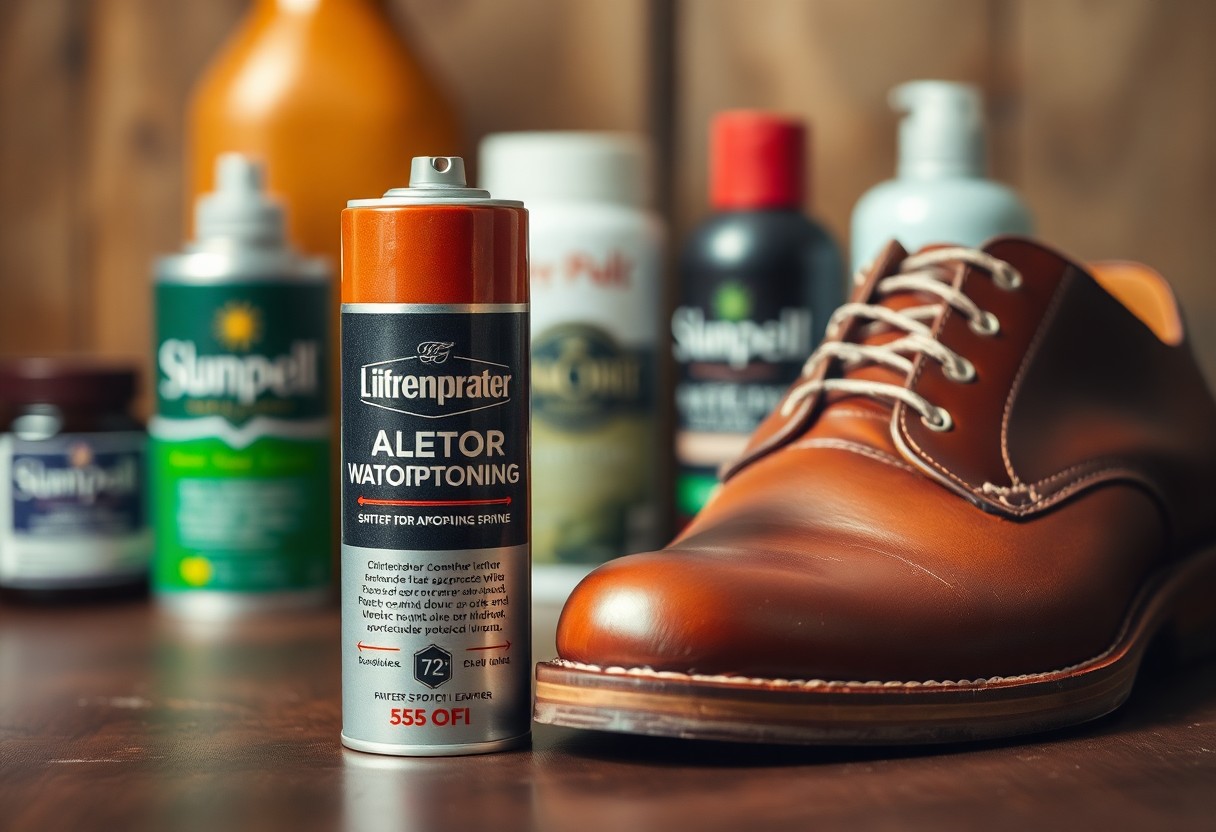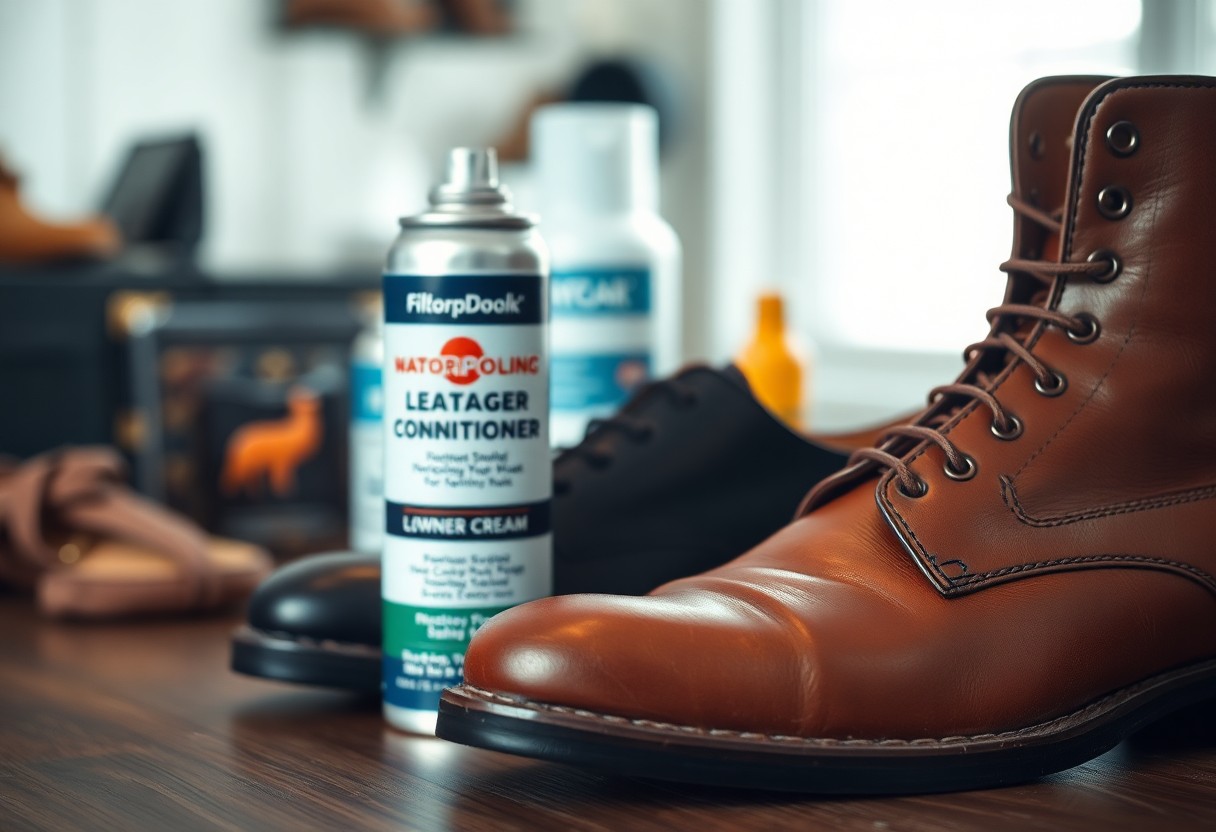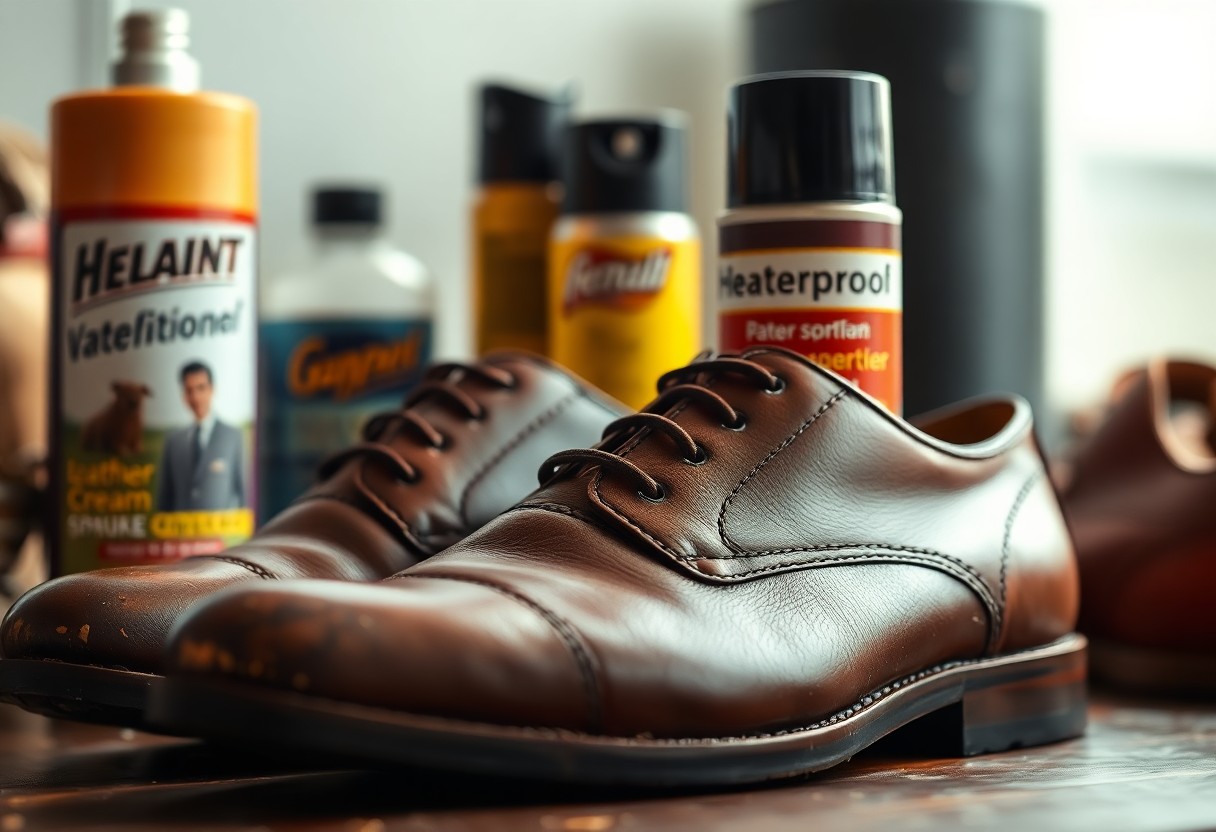Leather care mistakes can result in irreversible damage to your valuable footwear, with one of the most common mistakes being the use of waterproofing spray on smooth leather. While these sprays may seem like a quick fix for protecting your shoes, they can interfere with the essential nutrients that need to penetrate the leather, causing it to dry out and crack over time. Smooth leather shoes are naturally designed with water-resistant properties in their grain layer, requiring nourishment through shoe creams and waxes to maintain their durability. Rather than relying on sprays, choose high-quality leather conditioners and wax polishes that both nourish and protect the leather, ensuring its longevity while retaining its natural qualities.
Mastering the Fundamentals of Leather Protection for Longevity
To guarantee the longevity of your leather products, it’s essential to understand their protective attributes. Full grain leather boasts natural water-resistant properties because of its tightly woven fiber structure, but these properties need proper maintenance to remain effective. The overall durability of your leather items is heavily influenced by how well they are cared for. Using waterproofing sprays can hinder the leather’s ability to breathe, leading to significant damage over time if not managed appropriately. Understanding the right care methods is vital for maintaining the integrity and appearance of your leather goods.
Uncovering the Unique Benefits of Full Grain Leather for Protection
After undergoing the tanning process, full grain leather keeps its original surface layer, which provides exceptional natural protection. Items crafted from this material feature an intact grain layer that offers impressive resistance to water and wear. This top layer is filled with natural oils and fibers forming a protective barrier, making it unnecessary and potentially harmful to use additional waterproofing sprays, which can compromise the leather’s health over time.
Comprehending Leather’s Moisture Regulation and Aging Process
Grain leather must effectively maintain its ability to absorb and release moisture. The pores in your leather facilitate its capacity to breathe and regulate moisture, which keeps it flexible and prevents unsightly cracking. However, applying waterproofing sprays can seal these pores, impeding essential airflow and upsetting the natural moisture equilibrium. Moreover, as leather ages, it needs proper nourishment from conditioning products. When waterproofing sprays are used, they form a barrier that prevents essential conditioning oils from penetrating the leather, leading it to become dry and brittle over time. Regular application of leather cream is essential for allowing your leather to develop a rich, desirable patina while aging gracefully.

Recognizing the Dangers of Relying on Waterproofing Spray
Many individuals erroneously believe that waterproofing spray is the ultimate solution for preserving their leather shoes; however, this common practice can cause significant harm to your footwear. While these sprays can provide an immediate protective barrier against moisture, they also obstruct necessary nutrients from reaching the leather, paving the way for potential long-term deterioration.
Dispelling Marketing Myths Surrounding Leather Care Products
The influence of aggressive marketing strategies and well-meaning advice from retail staff may have led you to think that waterproofing spray is essential for all leather shoes. This misconception has been perpetuated by numerous shoe retailers, primarily due to the high profit margins and frequent repurchase cycles associated with such products. In reality, regular smooth leather possesses natural protective qualities that do not require additional spray-on barriers for effective safeguarding, contradicting popular beliefs.
Weighing Immediate Benefits Against Long-term Leather Damage
Waterproofing sprays begin to damage your leather shoes by forming a barrier that prevents essential oils and conditioning agents from saturating the leather. While you may initially perceive improved water resistance, the truth is that your leather will gradually become dry and brittle without critical nourishment. The consequences of using waterproofing sprays on smooth leather extend beyond mere surface protection. Your leather requires consistent nourishment to maintain its flexibility and durability. When shoe creams and conditioners cannot penetrate the leather due to the spray barrier, the material is at risk of cracking and deterioration, significantly shortening your shoes’ lifespan. Utilizing natural waxes and proper conditioning provides superior long-term protection while promoting the leather’s health.

Diving Deeper Into the Science of Leather Care
A fundamental aspect of effective leather care lies in understanding its molecular structure. The collagen fiber networks within your leather shoes require both protection and nourishment. When you apply products to leather, they can either coat the fibers or penetrate deeply into their structure. This interaction is crucial for the long-term health and durability of your leather shoes.
Recognizing the Importance of Regularly Nourishing Your Leather
It is vital to realize that your leather shoes demand regular nourishment to uphold their quality. The natural oils within your leather play a critical role in preventing cracking and maintaining flexibility. Over time, these oils diminish due to regular wear and environmental exposure. To preserve the leather’s structural integrity, it is essential to replenish these oils through consistent conditioning practices.
Understanding How Waterproofing Sprays Create Barrier Effects
A significant drawback of waterproofing sprays is their tendency to form a barrier on the leather surface. When these sprays are applied to smooth leather, they create an impermeable layer that obstructs both moisture and essential nutrients. This barrier inhibits your leather care products from effectively penetrating the surface, ultimately leading to a gradual decline in the leather’s quality over time.
The barrier effect of waterproofing sprays introduces a problematic cycle for your shoes. Although these sprays effectively block water, they also prevent the absorption of vital conditioning products needed to maintain the leather’s health. Consequently, the leather may appear superficially protected but is actually dehydrating and becoming brittle underneath. Silicone-based sprays pose an especially high risk, as they create a permanent barrier that is difficult to remove without causing damage to the leather.
Implementing Proven Leather Protection Techniques for Longevity
Contrary to common misconceptions, your smooth leather shoes require targeted care methods that align with the innate characteristics of full-grain leather. The best approach combines traditional techniques with products designed to enhance the leather’s natural protective qualities, ensuring both immediate protection and lasting durability for your footwear investment.
Examining the Advantages of Wax-based Solutions for Leather Care
A highly effective alternative to waterproofing sprays is found in premium wax-based products. These solutions work synergistically with your leather’s natural grain rather than against it. When you apply wax polish, it creates a protective barrier that still allows the leather to breathe, making it particularly beneficial for toe caps and areas of high wear.
Maximizing the Benefits of Cream and Conditioner Applications
In contrast to conventional spray treatments, leather creams and conditioners provide essential nourishment while preserving the inherent protective properties of the leather. Your shoes benefit from oils that deeply penetrate the material, helping to prevent drying and cracking. Furthermore, the regular application of cream and conditioner creates a cumulative effect that enhances leather quality over time. The natural oils found in these products support the leather’s flexibility and strength, while allowing it to develop a beautiful patina. For optimal leather condition, it is advisable to apply these products every 4-6 wears.

Identifying Scenarios Where Waterproofing Spray is Appropriate
While smooth leather does not require waterproofing spray, certain materials benefit significantly from such treatments. These products can create an effective water-resistant barrier on materials that lack inherent protection. Waterproofing sprays are particularly useful for suede, nubuck, and various textiles, where the material structure does not provide natural moisture resistance.
Enhancing the Durability of Suede and Nubuck with Waterproofing Spray
By treating your suede or nubuck footwear with waterproofing spray, you substantially improve their resistance to moisture damage. Although many modern suede materials come pre-treated with factory waterproofing, applying additional protection can help maintain this defense over time. The use of spray creates a protective barrier that effectively prevents water from penetrating these delicate materials.
Securing Textile Footwear Against Water Damage
In addition to leather alternatives, textile footwear requires specialized protection from water damage. Materials such as canvas, mesh, and synthetic fabrics can achieve enhanced water resistance through proper spray application. Most textile materials are naturally absorbent, making them vulnerable to water damage and staining.
Moreover, waterproofing sprays for textiles help maintain the shape and color of your shoes. The barriers they create also prevent dirt and debris from embedding within the fabric fibers. It’s recommended to reapply the spray every 3-4 months for optimal protection, depending on how frequently the shoes are worn and the prevailing weather conditions.
Expert Insights on Effective Leather Care Techniques
Not all leather treatments are created equal. Experts in leather care strongly advise against using waterproofing sprays on smooth leather. Your full-grain leather shoes require specialized care that enables them to breathe and absorb nourishing treatments. Utilizing inappropriate products can lead to costly leather damage that may run into hundreds of dollars.
Expert Insights from Tannery Specialists on Leather Maintenance
To maintain leather quality, tannery specialists emphasize that full-grain leather inherently possesses natural water-resistant properties in its outer layer. To preserve the leather’s protective qualities, it’s necessary to apply oils and waxes. Waterproofing sprays can obstruct these vital treatments from penetrating the leather, leading to deterioration.
Guidance from Professional Cobblers on Leather Care Practices
For the long-term care of leather, professional cobblers advocate for the use of wax-based products over waterproofing sprays. Your shoes will thrive from treatments that not only protect but also nourish the leather. Statistics reveal that 90% of premature leather damage arises from the use of inappropriate care products.
By following proper leather care techniques, your shoes can last an impressive 15-20 years rather than merely 2-3 years with inadequate maintenance. Traditional wax treatments allow leather to retain its natural attributes while providing sufficient moisture protection. Your investment in high-quality leather footwear deserves meticulous care practices that preserve both aesthetic appeal and durability.
Essential Takeaways for Optimal Leather Care
Your smooth leather shoes necessitate appropriate care that excludes waterproofing sprays. Instead, prioritize the use of shoe creams and waxes that nourish the leather while providing effective water protection. Full-grain leather innately possesses natural protective qualities due to its grain layer, and waterproofing sprays may hinder essential oils from penetrating the leather, leading to dryness and cracking. Reserve waterproofing sprays for suede, nubuck, or textile footwear, where they can perform effectively. By making informed product choices, you can protect your leather shoes while ensuring their longevity.
Common Queries About Leather Care Practices
Q: Why is waterproofing spray harmful to smooth leather shoes?
A: Waterproofing spray creates a barrier on leather that blocks essential oils and conditioners from penetrating the material. While it provides water protection, it inhibits the necessary nourishment of the leather, which can lead to dryness and potential cracking over time, ultimately decreasing the lifespan of the shoes.
Q: What alternatives should I consider instead of waterproofing spray for smooth leather shoes?
A: It’s advisable to use a combination of shoe cream and wax polish instead. Shoe cream delivers essential oils to nourish the leather, while wax polish forms a protective layer that helps repel water. This method aligns well with the natural protective properties of full-grain leather, enhancing its health while offering effective water resistance.
Q: Which types of footwear can benefit from waterproofing spray applications?
A: Waterproofing spray is ideal for materials like suede, nubuck, and textiles. These materials typically lack the natural protection found in smooth leather and thus gain from the protective barrier that waterproofing sprays create. Many modern suedes and nubucks may already have factory waterproofing treatments, but additional applications can reinforce and maintain this level of protection.
The Article Why you shouldn’t use waterproofing spray on regular smooth leather and better alternatives appeared first on My Shoes Finder
The Article Waterproofing Spray on Smooth Leather: Risks and Alternatives Was Found On https://limitsofstrategy.com



Comments are closed